Burt A. The Evolution of the British Empire and Commonwealth From the American Revolution
Подождите немного. Документ загружается.

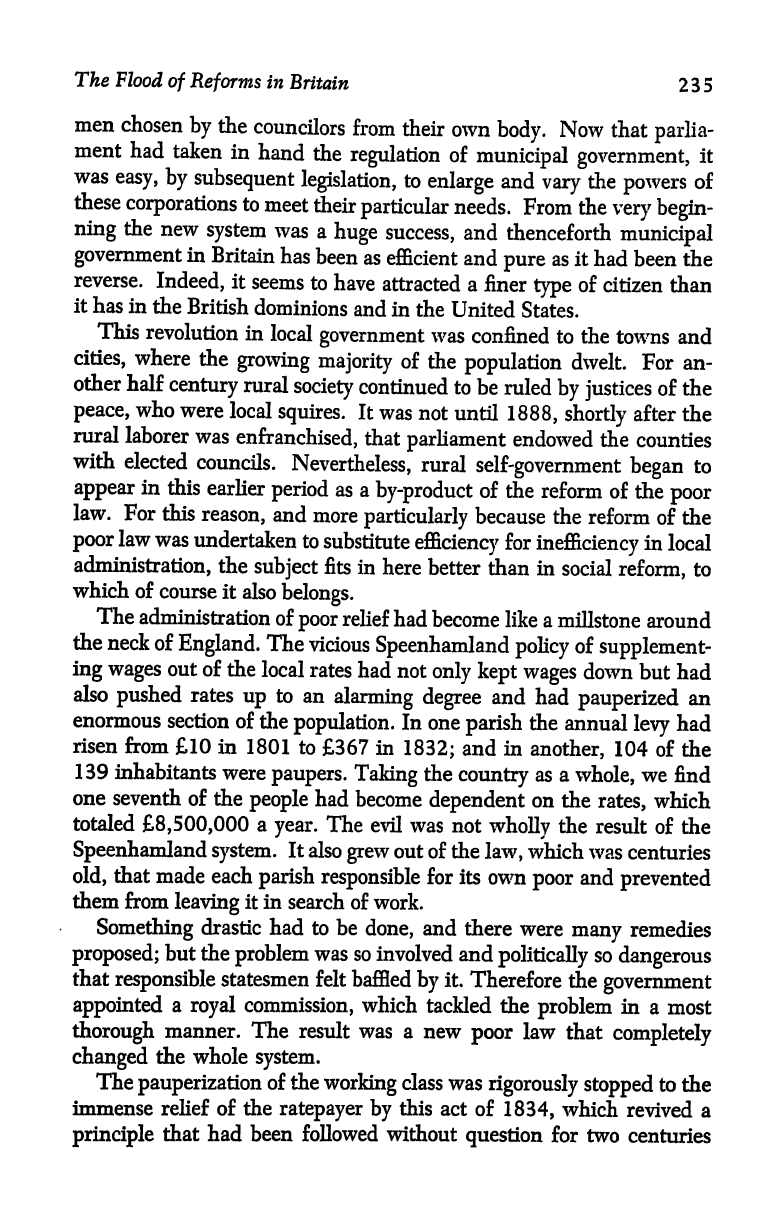
The
Flood
of Reforms
in
Britain
235
men
chosen
by
the
councilors
from
their
own
body.
Now
that
parlia-
ment
had
taken
in
hand
the
regulation
of
municipal
government,
it
was
easy,
by
subsequent
legislation,
to
enlarge
and
vary
the
powers
of
these
corporations
to
meet
their
particular
needs. From the
very
begin-
ning
the
new
system
was
a
huge
success,
and
thenceforth
municipal
government
in
Britain
has
been
as
efficient
and
pure
as it
had been the
reverse.
Indeed,
it
seems
to
have
attracted
a
finer
type
of
citizen
than
it
has
in
the
British
dominions
and in the
United States.
This
revolution
in
local
government
was
confined to
the
towns and
cities,
where
the
growing
majority
of
the
population
dwelt. For
an-
other half
century
rural
society
continued
to be
ruled
by justices
of the
peace,
who
were
local
squires.
It
was
not
until
1888,
shortly
after
the
rural
laborer
was
enfranchised,
that
parliament
endowed the
counties
with
elected
councils.
Nevertheless,
rural
self-government
began
to
appear
in
this
earlier
period
as a
by-product
of the
reform
of the
poor
law. For
this
reason,
and
more
particularly
because the
reform
of
the
poor
law
was
undertaken
to
substitute
efficiency
for
inefficiency
in
local
administration,
the
subject
fits in
here better
than in
social
reform,
to
which
of
course
it
also
belongs.
The
administration
of
poor
relief had
become
like a
millstone
around
the
neck
of
England.
The
vicious
Speenhamland
policy
of
supplement-
ing wages
out
of the
local
rates
had not
only
kept
wages
down
but
had
also
pushed
rates
up
to an
alarming
degree
and
had
pauperized
an
enormous
section
of the
population.
In one
parish
the
annual
levy
had
risen from
10
in
1801
to
367 in
1832;
and in
another,
104 of
the
139
inhabitants
were
paupers.
Taking
the
country
as
a
whole,
we
find
one
seventh
of the
people
had
become
dependent
on
the
rates,
which
totaled
8,500,000
a
year.
The
evil
was
not
wholly
the result
of
the
Speenhamland
system.
It
also
grew
out of the
law,
which
was
centuries
old,
that
made each
parish
responsible
for its own
poor
and
prevented
them
from
leaving
it
in
search
of work.
Something
drastic
had to be
done,
and
there
were
many
remedies
proposed;
but the
problem
was
so
involved and
politically
so
dangerous
that
responsible
statesmen felt
baffled
by
it.
Therefore the
government
appointed
a
royal
commission,
which
tackled
the
problem
in
a
most
thorough
manner. The
result
was a
new
poor
law
that
completely
changed
the whole
system.
The
pauperization
of
the
working
class
was
rigorously
stopped
to
the
immense relief of
the
ratepayer
by
this
act
of
1834,
which
revived a
principle
that
had been
followed without
question
for
two
centuries
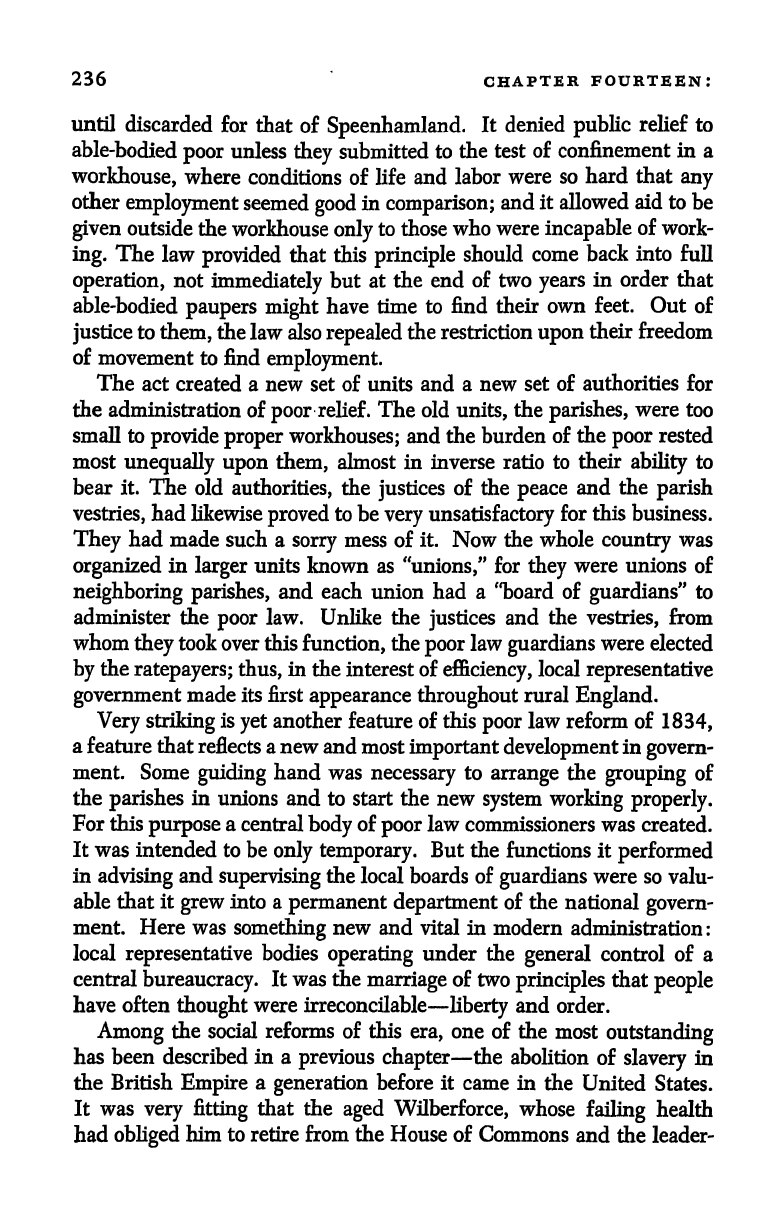
236
CHAPTER
FOURTEEN:
until
discarded for
that of
Speenhamland.
It denied
public
relief
to
able-bodied
poor
unless
they
submitted
to
the test
of confinement in a
workhouse,
where
conditions
of life
and
labor
were
so
hard that
any
other
employment
seemed
good
in
comparison;
and
it
allowed
aid
to
be
given
outside
the
workhouse
only
to
those
who
were
incapable
of
work-
ing.
The law
provided
that
this
principle
should
come back
into
full
operation,
not
immediately
but
at the end
of two
years
in
order
that
able-bodied
paupers
might
have
time to
find
their own
feet.
Out
of
justice
to
them,
the
law
also
repealed
the restriction
upon
their
freedom
of
movement
to find
employment.
The
act
created
a new
set of
units
and
a
new
set of
authorities
for
the
administration of
poor
relief
.
The old
units,
the
parishes,
were
too
small to
provide
proper
workhouses;
and
the burden
of
the
poor
rested
most
unequally
upon
them,
almost in inverse ratio
to their
ability
to
bear
it.
TTie
old
authorities,
the
justices
of
the
peace
and
the
parish
vestries,
had
likewise
proved
to be
very
unsatisfactory
for
this
business.
They
had made
such a
sorry
mess of
it.
Now
the whole
country
was
organized
in
larger
units
known as
"unions,"
for
they
were
unions
of
neighboring
parishes,
and each union had
a "board of
guardians"
to
administer
the
poor
law. Unlike the
justices
and
the
vestries,
from
whom
they
took
over this
function,
the
poor
law
guardians
were
elected
by
the
ratepayers;
thus,
in
the interest of
efficiency,
local
representative
government
made its
first
appearance
throughout
rural
England.
Very
striking
is
yet
another
feature of this
poor
law reform
of
1834,
a
feature
that
reflects a new
and
most
important development
in
govern-
ment. Some
guiding
hand
was
necessary
to
arrange
the
grouping
of
the
parishes
in
unions
and
to start
the
new
system
working
properly.
For
this
purpose
a
central
body
of
poor
law
commissioners was
created.
It
was intended to be
only
temporary.
But the
functions it
performed
in
advising
and
supervising
the
local boards of
guardians
were
so valu-
able that
it
grew
into
a
permanent
department
of
the
national
govern-
ment.
Here
was
something
new
and vital in modern
administration
:
local
representative
bodies
operating
under
the
general
control of
a
central
bureaucracy.
It was
the
marriage
of
two
principles
that
people
have
often
thought
were
irreconcilable
liberty
and order.
Among
the
social reforms
of
this
era,
one of
the most
outstanding
has
been
described
in
a
previous
chapter
the
abolition
of
slavery
in
the
British
Empire
a
generation
before it
came in
the
United
States.
It was
very
fitting
that the
aged
Wilberforce,
whose
failing
health
had
obliged
him to retire from the
House of
Commons
and the leader-
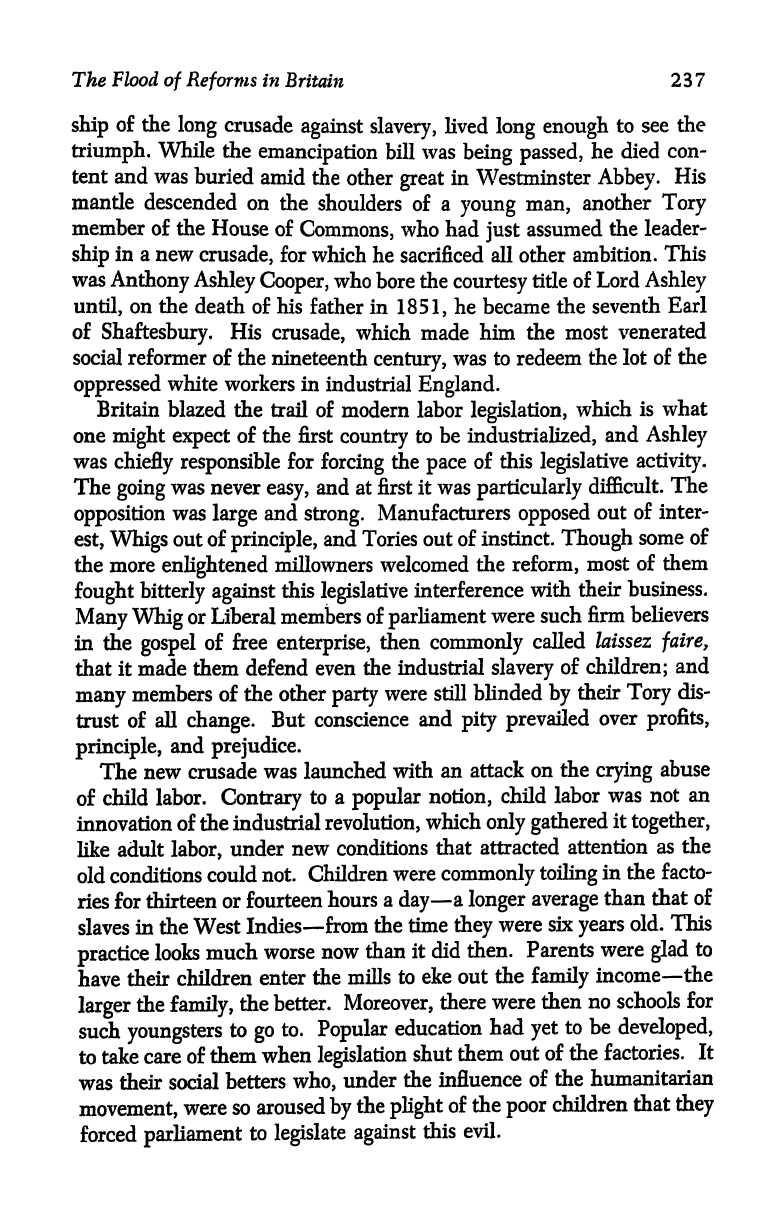
The
Flood
of
Reforms
in
Britain
237
ship
of the
long
crusade
against
slavery,
lived
long
enough
to
see
the
triumph.
While the
emancipation
bill
was
being
passed,
he
died
con-
tent and was
buried
amid
the
other
great
in
Westminster
Abbey.
His
mantle
descended
on
the
shoulders of
a
young
man,
another
Tory
member
of
the
House
of
Commons,
who had
just
assumed
the
leader-
ship
in
a
new
crusade,
for which
he
sacrificed
all other
ambition.
This
was
Anthony
Ashley
Cooper,
who
bore
the
courtesy
title
of
Lord
Ashley
until,
on the
death of his
father in
1851,
he became
the seventh
Earl
of
Shaftesbury.
His
crusade,
which made
him the
most
venerated
social
reformer
of
the
nineteenth
century,
was
to
redeem
the lot
of
the
oppressed
white workers
in
industrial
England.
Britain
blazed
the trail of
modern labor
legislation,
which
is
what
one
might
expect
of
the
first
country
to be
industrialized,
and
Ashley
was
chiefly responsible
for
forcing
the
pace
of
this
legislative
activity.
The
going
was
never
easy,
and
at first it
was
particularly
difficult.
The
opposition
was
large
and
strong.
Manufacturers
opposed
out
of
inter-
est,
Whigs
out
of
principle,
and
Tories
out of
instinct.
Though
some
of
the more
enlightened
millowners welcomed
the
reform,
most
of
them
fought
bitterly
against
this
legislative
interference
with
their
business.
Many Whig
or
Liberal
members of
parliament
were
such
firm believers
in the
gospel
of
free
enterprise,
then
commonly
called
laissez
faire,
that it
made
them defend
even the
industrial
slavery
of
children;
and
many
members of
the other
party
were still
blinded
by
their
Tory
dis-
trust
of all
change.
But conscience
and
pity
prevailed
over
profits,
principle,
and
prejudice.
The
new
crusade
was
launched
with
an
attack
on
the
crying
abuse
of
child
labor.
Contrary
to
a
popular
notion,
child labor
was
not an
innovation
of
the
industrial
revolution,
which
only
gathered
it
together,
like
adult
labor,
under
new conditions
that
attracted
attention
as the
old
conditions
could
not.
Children
were
commonly toiling
in the
facto-
ries for
thirteen or
fourteen
hours
a
day
a
longer
average
than that
of
slaves
in the
West
Indies
from
the time
they
were
six
years
old.
This
practice
looks
much
worse
now
than it
did
then.
Parents
were
glad
to
have
their
children
enter
the
mills
to
eke out
the
family
income
the
larger
the
family,
the
better.
Moreover,
there
were
then
no schools
for
such
youngsters
to
go
to.
Popular
education
had
yet
to
be
developed,
to
take
care
of
them
when
legislation
shut
them
out
of the
factories.
It
was
their
social
betters
who,
under
the
influence
of
the
humanitarian
movement,
were
so
aroused
by
the
plight
of
the
poor
children
that
they
forced
parliament
to
legislate
against
this
evil.

238
CHAPTER
FOURTEEN:
The
Factory
Act of
1833,
based
on the work of another
royal
com-
mission,
was
the
beginning
of the
modern
statutory
code that
regulates
the
conditions
of
labor
in
all industries. It
prohibited
the
employment
of
any
children
under
the
age
of nine and
limited
the
hours
of
labor
for
all who
were
under
eighteen
to
nine
hours if
they
were
not
thir-
teen
years
old,
and
to
twelve if
they
were
over.
This was the first
act
of
its
kind to
have
teeth
in it. The act
of
1802,
mentioned in
an
earlier
chapter,
and
another act
that had been
passed
in 1819
had
remained
quite
harmless
because the
responsibility
for
their
enforcement
had
been
left
to
the
justices
of the
peace,
country squires
who
had
neither
the
interest
nor the
capacity
that was
required
for
this
purpose.
The
act
of
1833
introduced a
principle
that was
new in
the
English-speak-
ing
world
by
providing
for the
inspection
of
factories
by
a
staff
of
paid
government
officials
who had
power
to
enforce
the
regulations.
This
provision
was
not
regarded
as a
temporary
expedient,
like
the
creation of the
poor
law
commissioners
in
the
following
year.
It
was
intended to be
permanent.
It was
the
real
beginning,
the
first
in
any
self-governing country,
of
a
central
bureaucracy
that
was to
carry
effec-
tive
state
intervention
into
the
daily
life
of
the
nation.
Further
labor
legislation
was
simply
a
question
of
time
and
pressure.
In
1840,
Ashley
secured a
law
prohibiting
the
employment
of
children
as
chimneysweeps,
a
ghastly
business;
and
he
succeeded
in
getting
a
royal
commission
appointed
to
investigate
conditions
in
the
mines,
which
proved
to
be
even
blacker.
Down
in
the
bowels
of
the
earth,
where
the
atmosphere
was
so
bad that
a
candle
would
not
burn,
women
and children
had
to
crawl
through
water
along
passages
scarcely
more
than
two feet
high
the
thickness
of
many
seams
dragging
heavy
loads of
coal
to which
they
were
harnessed
like
beasts of
burden.
Brute
force
commonly
ruled in the
mines,
many
of
which
were
veritable
pits
of
iniquity.
The
revelations
of
the
commission's
report,
submitted
early
in
1842,
were so
horrible that
parliament
lost
no
time
in
responding
to
Ashley's
appeal.
He
demanded
the
exclusion
of
all
women
and
of
all
children
under
thirteen
from
employment
underground
and
the
extension
of
government
inspection
to
the
mines.
The
owners
stoutly
resisted
this
interference
with
their
industry,
asserting
that
they
would
be
ruined
unless
they
could use
boys
as
young
as
eight,
and
they
were
able to
force an
amendment
of
Ashley's
bill so
that
boys
from
ten
to
thirteen
could
be
emplpyed
for
three
days
a
week.
Turning
back
to
the
factories,
Ashley
wrung
from
parliament
in
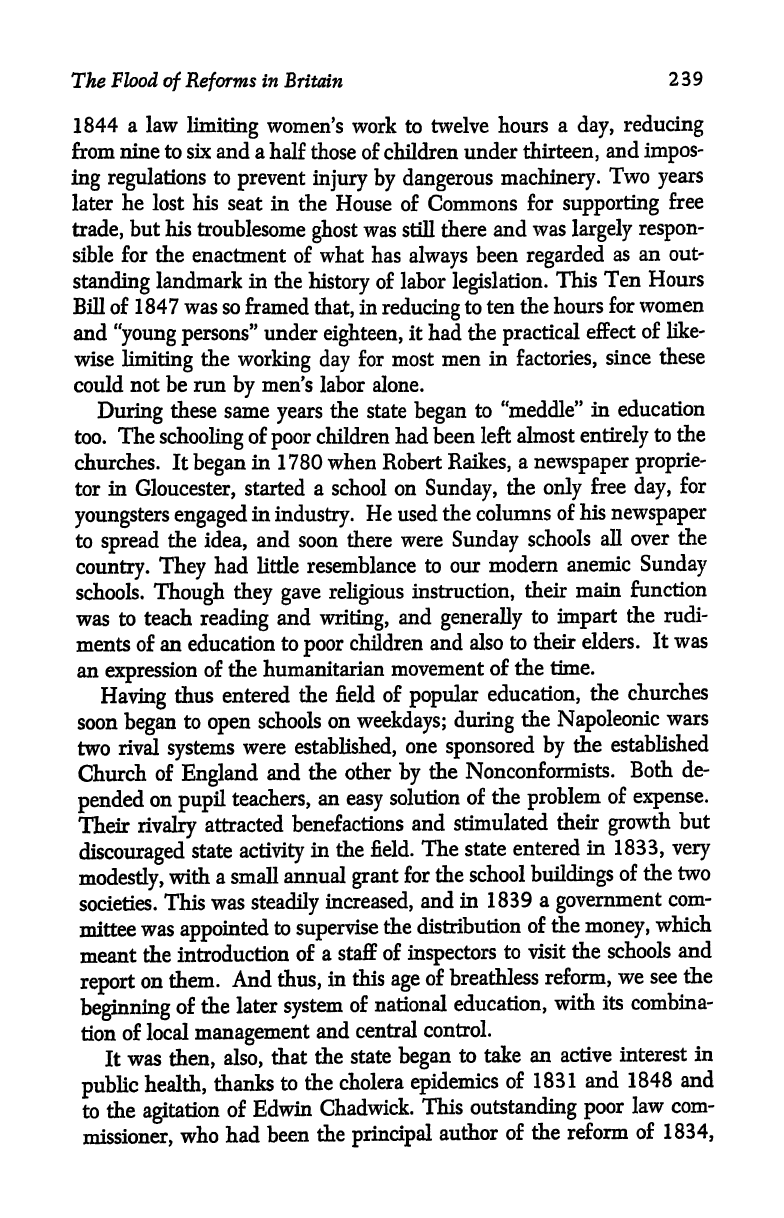
The
Flood
of Reforms
in
Britain
239
1844
a law
limiting
women's work
to
twelve
hours
a
day,
reducing
from
nine to six and a
half
those of children
under
thirteen,
and
impos-
ing
regulations
to
prevent
injury by
dangerous
machinery.
Two
years
later
he
lost
his
seat
in the
House of
Commons
for
supporting
free
trade,
but his
troublesome
ghost
was
still
there
and
was
largely
respon-
sible
for the
enactment
of what has
always
been
regarded
as
an out-
standing
landmark in the
history
of labor
legislation.
This
Ten
Hours
Bill
of
1847
was so
framed
that,
in
reducing
to
ten the hours
for
women
and
"y
un
g persons"
under
eighteen,
it had
the
practical
effect
of like-
wise
limiting
the
working
day
for
most
men
in
factories,
since
these
could
not be
run
by
men's
labor
alone.
During
these
same
years
the state
began
to
"meddle"
in education
too.
The
schooling
of
poor
children
had
been
left
almost
entirely
to the
churches.
It
began
in 1780 when Robert
Raikes,
a
newspaper
proprie-
tor
in
Gloucester,
started
a school
on
Sunday,
the
only
free
day,
for
youngsters
engaged
in
industry.
He used
the columns
of
his
newspaper
to
spread
the
idea,
and
soon there
were
Sunday
schools
all
over
the
country.
They
had little
resemblance
to
our
modern
anemic
Sunday
schools.
Though
they
gave
religious
instruction,
their
main
function
was to
teach
reading
and
writing,
and
generally
to
impart
the
rudi-
ments
of
an
education
to
poor
children
and also
to
their
elders.
It
was
an
expression
of
the
humanitarian
movement
of the
time.
Having
thus
entered
the field
of
popular
education,
the
churches
soon
began
to
open
schools
on
weekdays;
during
the
Napoleonic
wars
two
rival
systems
were
established,
one
sponsored
by
the
established
Church
of
England
and
the
other
by
the
Nonconformists.
Both de-
pended
on
pupil
teachers,
an
easy
solution
of
the
problem
of
expense.
Their
rivalry
attracted benefactions
and
stimulated
their
growth
but
discouraged
state
activity
in the
field.
The state
entered
in
1833,
very
modestly,
with
a small
annual
grant
for
the
school
buildings
of
the
two
societies.
This
was
steadily
increased,
and
in
1839
a
government
com-
mittee
was
appointed
to
supervise
the
distribution
of
the
money,
which
meant
the
introduction
of
a
staff of
inspectors
to visit
the
schools
and
report
on
them.
And
thus,
in
this
age
of
breathless
reform,
we see
the
beginning
of
the
later
system
of
national
education,
with
its combina-
tion
of
local
management
and
central
control.
It
was
then,
also,
that
the
state
began
to
take
an
active
interest
in
public
health,
thanks
to
the
cholera
epidemics
of
1831
and 1848
and
to
the
agitation
of
Edwin
Chadwick.
This
outstanding
poor
law
com-
missioner,
who
had been
the
principal
author
of
the
reform
of
1834,

240
CHAPTER
FOURTEEN:
knew
as
no other
man
how
appalling
were
sanitary
conditions
in
all
urban
centers,
and
he
was
consumed
with
reforming
zeal.
When
the
dread
Asiatic
disease
hit
England
a
second
time,
he
had
little
difficulty
in
persuading
parliament
to
pass
the first
Public
Health
Act.
This
meas-
ure
of 1848
set
up
a
central
Board
of
Health
authorized
to
establish
local
Boards
of Health with extensive
powers.
Here
again
we see
the
new
development
of
administration:
a
central
bureaucracy
assisting
and
assisted
by
local bodies.
Many
other
reforms of
the
time
were effected
by
the
growing
human-
itarian
spirit.
It
would
be tedious to list
them
all,
but
we should
notice
a
few.
By
the
early
thirties
the
milder
criminal
code that Peel
had
so
recently
inaugurated
came
to be
regarded
as too
severe,
with
the
result
that
by
1841
parliament
had abolished
the
death
penalty
for
all but
the
gravest
crimes. Persons accused
of
felonies
were
at last
permitted
to
be
represented by
counsel,
and
imprisonment
for
debt
disappeared
almost
entirely. Impressment
for the
navy
was
abandoned,
and
flog-
ging
in
the
army practically
ended.
Even dumb
creatures
found
legis-
lative
pity,
which
prohibited
such cruel
sports
as
cockfighting
and the
baiting
of
bulls, bears,
badgers,
or other animals.
Of
the economic
reforms
of this
era,
one
group
of
measures
dealt
with
the
organization
of
capital.
This was a
highly
important
matter in
Britain,
then
the
industrial,
commercial,
and financial center
of the
world.
It
was
at this
time
that
the
British
banking system
received
its
modern form.
The heart
of
it is the Bank
of
England,
the
oldest
bank
in
existence
anywhere,
having
been
founded
in 1694.
In return
for
advancing
a
large
loan
to
the
government,
it
received
a
monopoly.
Private
banks
were also
allowed,
but none could
get
a
charter,
and
none could
be
operated by
a
company
or
by
a
partnership
of
more
than
six members.
By
1800,
when the United States had
twenty-eight
banks,
Britain
had
them
by
the
hundred.
Among
them was
the
largest
merchant-
banking
house
in
the
world,
run
by
the
Baring
brothers,
grandsons
of
a
Lutheran
pastor
in
the German
city
of
Bremen,
and
sons
of an immi-
grant
who
had
made a
fortune
in the
manufacture
of cloth. Most
of
the
private
banks,
however,
were
small local concerns.
As the Bank
of
England
was
content to be
a
bankers' bank and the
financial
agent
of
the
government,
private
banks
handled
practically
all
the
ordinary
business
of
commerce and
industry,
and
they
issued their
own notes.
Because
the
country
was
off
gold
from 1797
to
1821,
and the Bank of
England
abandoned
the
issue
of notes
for
1
and
2
while
the
private
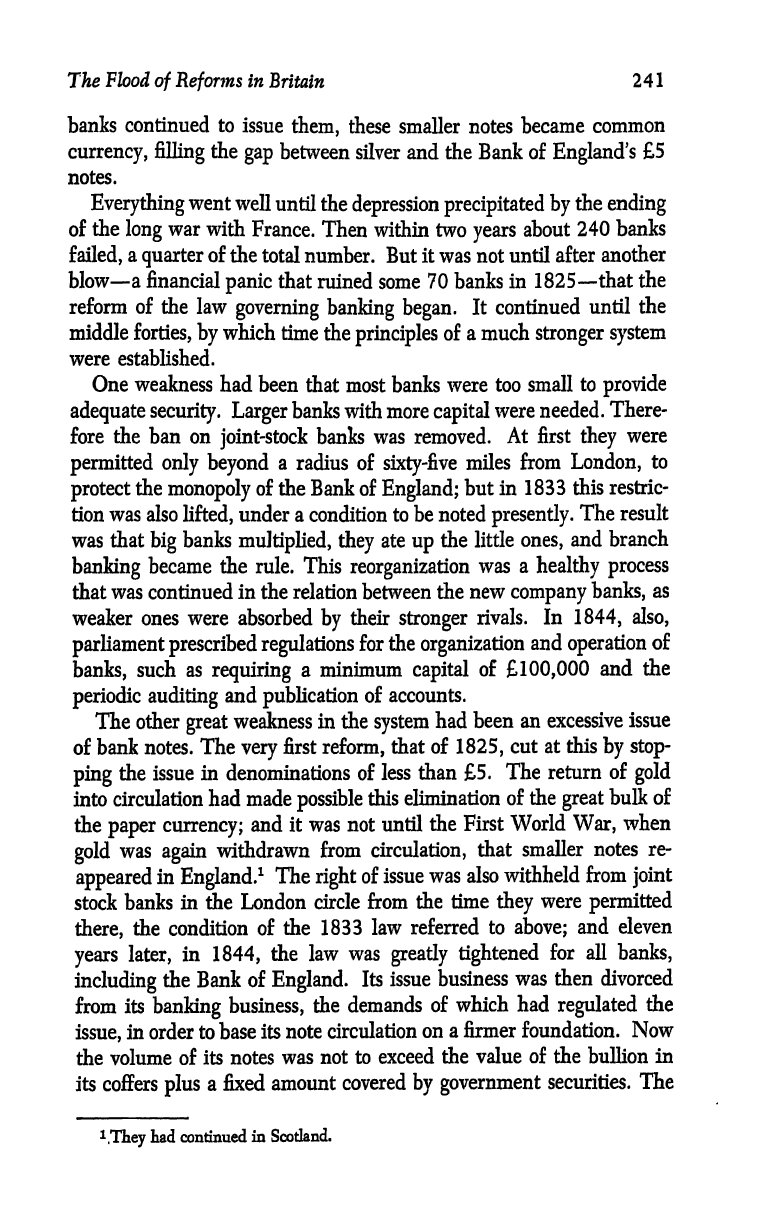
The
Fkod
of
Reforms
in
Britain
24
1
banks
continued to
issue
them,
these smaller
notes became
common
currency,
filling
the
gap
between
silver
and
the Bank of
England's
5
notes.
Everything
went
well
until the
depression precipitated
by
the
ending
of
the
long
war
with
France.
Then
within
two
years
about
240 banks
failed,
a
quarter
of
the
total number. But
it
was not
until
after
another
blow
a
financial
panic
that
ruined
some
70 banks
in
1825
that the
reform
of the law
governing
banking
began.
It
continued
until
the
middle
forties,
by
which
time the
principles
of
a much
stronger
system
were
established.
One weakness had been
that most banks
were
too
small to
provide
adequate security.
Larger
banks
with more
capital
were
needed.
There-
fore
the ban on
joint-stock
banks
was
removed.
At
first
they
were
permitted
only beyond
a
radius
of
sixty-five
miles
from
London,
to
protect
the
monopoly
of
the Bank of
England;
but
in
1833 this
restric-
tion
was
also
lifted,
under
a
condition
to be noted
presently.
The
result
was
that
big
banks
multiplied, they
ate
up
the little
ones,
and branch
banking
became the rule. This
reorganization
was
a
healthy
process
that
was
continued
in
the relation
between
the
new
company
banks,
as
weaker ones were absorbed
by
their
stronger
rivals.
In
1844,
also,
parliament
prescribed regulations
for
the
organization
and
operation
of
banks,
such
as
requiring
a minimum
capital
of
100,000
and
the
periodic
auditing
and
publication
of
accounts.
The other
great
weakness
in the
system
had
been
an
excessive
issue
of bank
notes.
The
very
first
reform,
that of
1825,
cut
at this
by
stop-
ping
the
issue
in
denominations of
less
than
5. The
return
of
gold
into circulation
had made
possible
this elimination
of
the
great
bulk
of
the
paper
currency;
and
it
was
not
until
the
First
World
War,
when
gold
was
again
withdrawn
from
circulation,
that
smaller
notes
re-
appeared
in
England.
1
The
right
of
issue
was also withheld
from
joint
stock
banks
in the London
circle
from the
time
they
were
permitted
there,
the condition
of
the 1833
law
referred
to
above;
and eleven
years
later,
in
1844,
the
law
was
greatly
tightened
for all
banks,
including
the Bank
of
England.
Its
issue
business
was
then
divorced
from
its
banking
business,
the
demands
of
which
had
regulated
the
issue,
in order to base
its
note circulation
on a
firmer foundation.
Now
the
volume
of its
notes
was
not to exceed
the
value
of
the bullion
in
its coffers
plus
a fixed
amount
covered
by government
securities. The
i.They
had continued
in
Scotland.
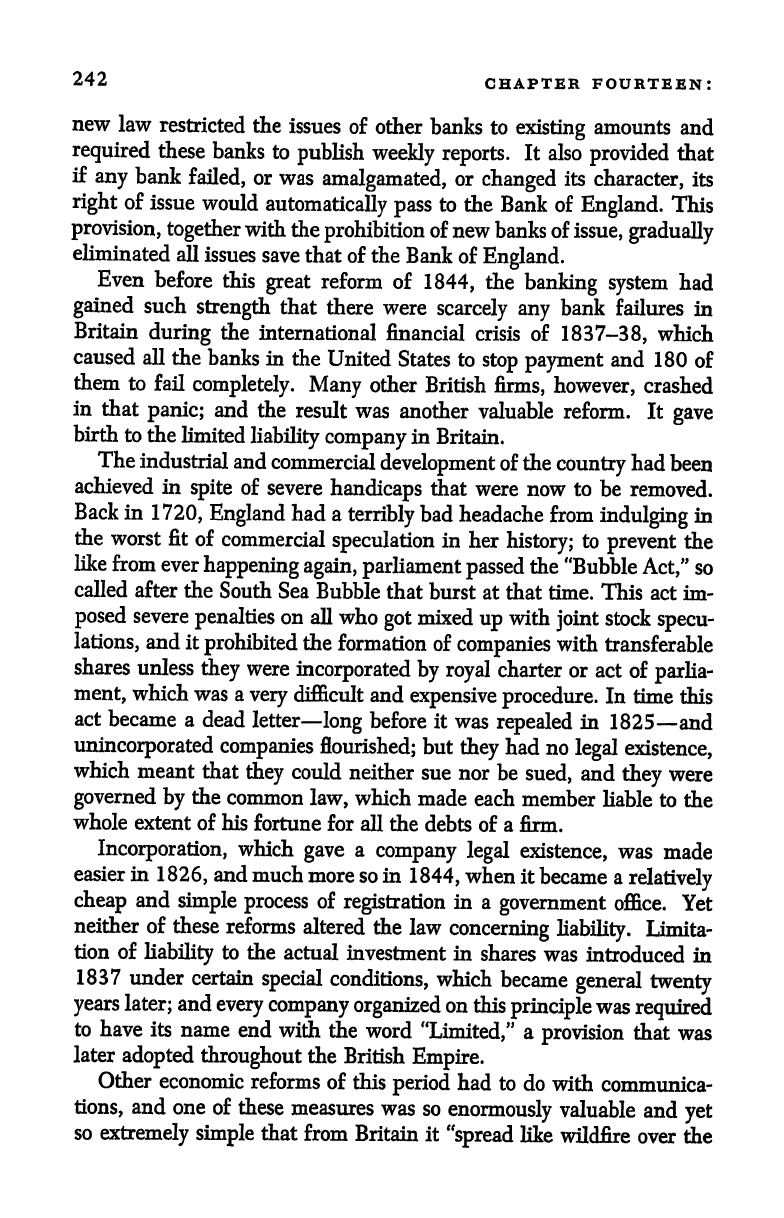
242
CHAPTER
FOURTEEN:
new
law
restricted
the
issues
of
other
banks to
existing
amounts
and
required
these
banks
to
publish
weekly
reports.
It
also
provided
that
if
any
bank
failed,
or
was
amalgamated,
or
changed
its
character,
its
right
of
issue
would
automatically
pass
to
the
Bank
of
England.
This
provision,
together
with the
prohibition
of
new banks of
issue,
gradually
eliminated
all
issues
save that
of
the
Bank
of
England.
Even
before
this
great
reform
of
1844,
the
banking
system
had
gained
such
strength
that there
were
scarcely
any
bank
failures
in
Britain
during
the
international
financial crisis
of
1837-38,
which
caused
all the
banks in
the
United
States to
stop payment
and 180
of
them
to
fail
completely.
Many
other
British
firms, however,
crashed
in
that
panic;
and the
result
was
another
valuable reform.
It
gave
birth
to
the
limited
liability
company
in
Britain.
The
industrial
and
commercial
development
of
the
country
had
been
achieved
in
spite
of
severe
handicaps
that
were now to
be
removed.
Back
in
1720,
England
had a
terribly
bad
headache from
indulging
in
the
worst fit
of
commercial
speculation
in her
history;
to
prevent
the
like
from
ever
happening
again,
parliament
passed
the
"Bubble
Act,"
so
called
after
the
South
Sea
Bubble
that
burst
at that time.
This
act
im-
posed
severe
penalties
on
all who
got
mixed
up
with
joint
stock
specu-
lations,
and it
prohibited
the
formation
of
companies
with
transferable
shares
unless
they
were
incorporated
by
royal
charter
or
act
of
parlia-
ment,
which
was a
very
difficult
and
expensive
procedure.
In
time
this
act
became a
dead
letter
long
before it
was
repealed
in 1825
and
unincorporated
companies
flourished;
but
they
had no
legal
existence,
which
meant
that
they
could neither
sue
nor
be
sued,
and
they
were
governed
by
the
common
law,
which
made
each
member
liable
to
the
whole
extent of
his
fortune
for
all the
debts
of a
firm.
Incorporation,
which
gave
a
company
legal
existence,
was
made
easier in
1826,
and
much
more
so in
1844,
when it
became a
relatively
cheap
and
simple process
of
registration
in a
government
office.
Yet
neither of
these
reforms
altered the
law
concerning
liability.
Limita-
tion of
liability
to the
actual
investment in
shares
was
introduced in
1837
under certain
special
conditions,
which
became
general
twenty
years
later;
and
every
company
organized
on
this
principle
was
required
to have
its name
end
with
the
word
"Limited,"
a
provision
that
was
later
adopted
throughout
the
British
Empire.
Other
economic
reforms
of
this
period
had
to
do
with
communica-
tions,
and one
of
these
measures
was so
enormously
valuable
and
yet
so
extremely
simple
that
from
Britain it
"spread
like
wildfire
over
the
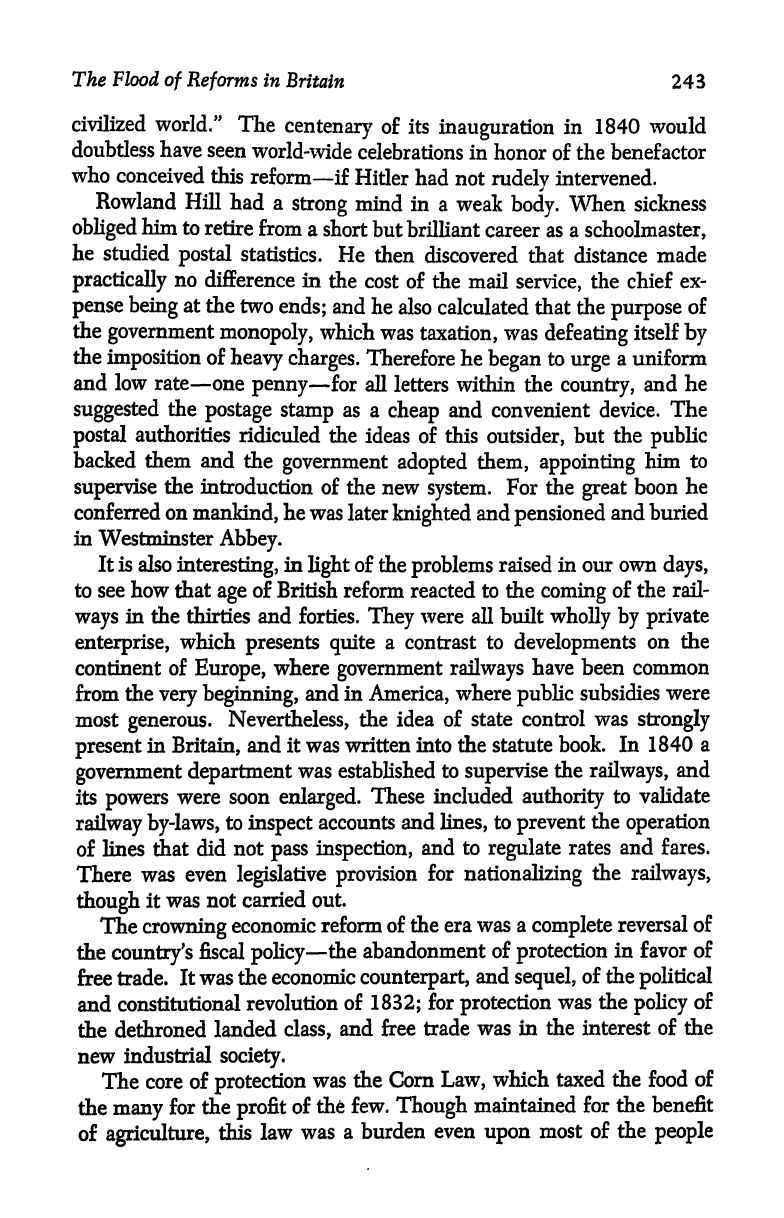
The
Flood
of
Reforms
in
Britain
243
civilized world."
The
centenary
of
its
inauguration
in
1840
would
doubtless
have seen
world-wide
celebrations
in
honor
of
the benefactor
who
conceived
this
reform
if
Hitler
had
not
rudely
intervened.
Rowland Hill
had a
strong
mind in a weak
body.
When
sickness
obliged
him to
retire
from
a
short
but
brilliant career as
a
schoolmaster,
he
studied
postal
statistics.
He
then
discovered that distance
made
practically
no
difference
in
the
cost of the
mail
service,
the chief
ex-
pense
being
at
the
two
ends;
and
he also
calculated
that the
purpose
of
the
government
monopoly,
which
was
taxation,
was
defeating
itself
by
the
imposition
of
heavy
charges.
Therefore he
began
to
urge
a
uniform
and low rate
one
penny
for
all
letters within
the
country,
and
he
suggested
the
postage stamp
as a
cheap
and
convenient
device.
The
postal
authorities
ridiculed the
ideas of this
outsider,
but the
public
backed them and
the
government adopted
them,
appointing
him
to
supervise
the
introduction of
the new
system.
For
the
great
boon
he
conferred on
mankind,
he was
later
knighted
and
pensioned
and
buried
in
Westminster
Abbey.
It
is
also
interesting,
in
light
of the
problems
raised
in
our
own
days,
to
see how
that
age
of British
reform
reacted
to
the
coming
of
the
rail-
ways
in
the thirties
and
forties.
They
were all built
wholly
by
private
enterprise,
which
presents
quite
a
contrast
to
developments
on
the
continent of
Europe,
where
government
railways
have been
common
from the
very
beginning,
and
in
America,
where
public
subsidies
were
most
generous.
Nevertheless,
the
idea of
state control
was
strongly
present
in
Britain,
and it
was written into
the
statute
book.
In
1840
a
government
department
was
established
to
supervise
the
railways,
and
its
powers
were
soon
enlarged.
These
included
authority
to
validate
railway by-laws,
to
inspect
accounts
and
lines,
to
prevent
the
operation
of
lines that
did
not
pass
inspection,
and to
regulate
rates and fares.
There
was
even
legislative
provision
for
nationalizing
the
railways,
though
it
was not carried out.
The
crowning
economic
reform
of
the era was
a
complete
reversal of
the
country's
fiscal
policy
the abandonment
of
protection
in
favor of
free
trade. It
was
the economic
counterpart,
and
sequel,
of the
political
and
constitutional
revolution
of
1832;
for
protection
was
the
policy
of
the dethroned
landed
class,
and free
trade
was in the interest
of
the
new
industrial
society.
The
core of
protection
was
the Corn
Law,
which taxed the food
of
the
many
for
the
profit
of
the
few.
Though
maintained
for
the
benefit
of
agriculture,
this
law
was
a
burden
even
upon
most
of the
people
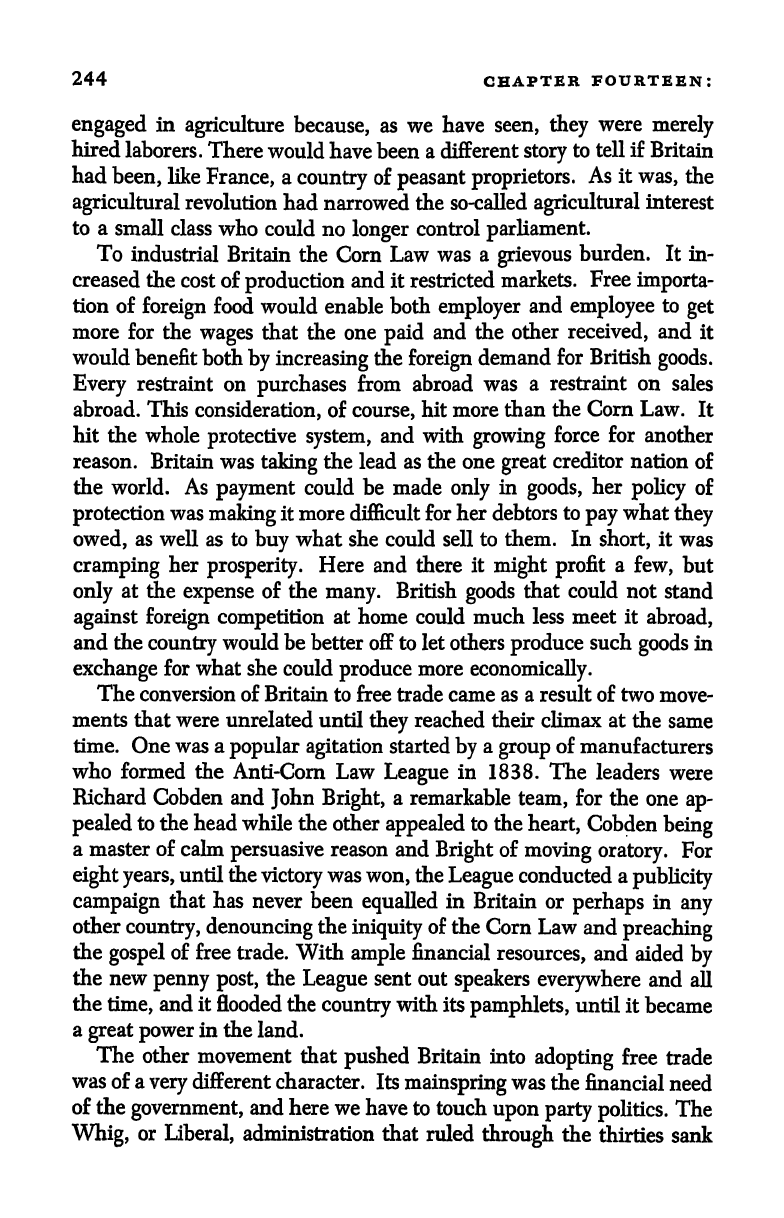
244
CHAPTER
FOURTEEN:
engaged
in
agriculture
because,
as
we
have
seen,
they
were
merely
hired
laborers. There
would have been
a different
story
to
tell if
Britain
had
been,
like
France,
a
country
of
peasant
proprietors.
As it
was,
the
agricultural
revolution
had
narrowed the
so-called
agricultural
interest
to a
small class
who
could no
longer
control
parliament.
To
industrial
Britain
the
Corn
Law
was
a
grievous
burden.
It
in-
creased the cost
of
production
and it restricted
markets.
Free
importa-
tion
of
foreign
food would
enable both
employer
and
employee
to
get
more
for the
wages
that the
one
paid
and the other
received,
and
it
would benefit
both
by
increasing
the
foreign
demand
for
British
goods.
Every
restraint on
purchases
from
abroad
was
a
restraint
on
sales
abroad.
This
consideration,
of
course,
hit
more than
the
Corn Law.
It
hit
the
whole
protective system,
and with
growing
force for
another
reason. Britain
was
taking
the
lead as
the
one
great
creditor nation
of
the
world.
As
payment
could
be made
only
in
goods,
her
policy
of
protection
was
making
it
more
difficult for
her
debtors
to
pay
what
they
owed,
as
well as
to
buy
what she could sell
to
them. In
short,
it
was
cramping
her
prosperity.
Here
and there
it
might
profit
a
few,
but
only
at
die
expense
of
the
many.
British
goods
that could
not
stand
against
foreign
competition
at
home could
much less meet it
abroad,
and
the
country
would
be
better off
to
let
others
produce
such
goods
in
exchange
for
what
she
could
produce
more
economically.
The conversion of
Britain
to
free
trade came
as a
result of
two
move-
ments
that
were
unrelated until
they
reached
their
climax
at
the
same
time.
One was
a
popular
agitation
started
by
a
group
of
manufacturers
who
formed the
Anti-Corn
Law
League
in
1838.
The
leaders
were
Richard Cobden
and
John
Bright,
a
remarkable
team,
for
the one
ap-
pealed
to
the
head
while
the
other
appealed
to
the
heart,
Cobden
being
a
master of calm
persuasive
reason
and
Bright
of
moving
oratory.
For
eight
years,
until die
victory
was
won,
the
League
conducted a
publicity
campaign
that has
never been
equalled
in Britain or
perhaps
in
any
other
country,
denouncing
the
iniquity
of the
Corn Law
and
preaching
the
gospel
of
free
trade.
With
ample
financial
resources,
and
aided
by
the new
penny
post,
the
League
sent
out
speakers
everywhere
and
all
the
time,
and
it
flooded
the
country
with
its
pamphlets,
until
it
became
a
great power
in
the
land.
The
other
movement that
pushed
Britain
into
adopting
free
trade
was
of
a
very
different
character. Its
mainspring
was
the
financial
need
of the
government,
and
here
we have
to
touch
upon
party
politics.
The
Whig,
or
Liberal,
administration that
ruled
through
the
thirties
sank
